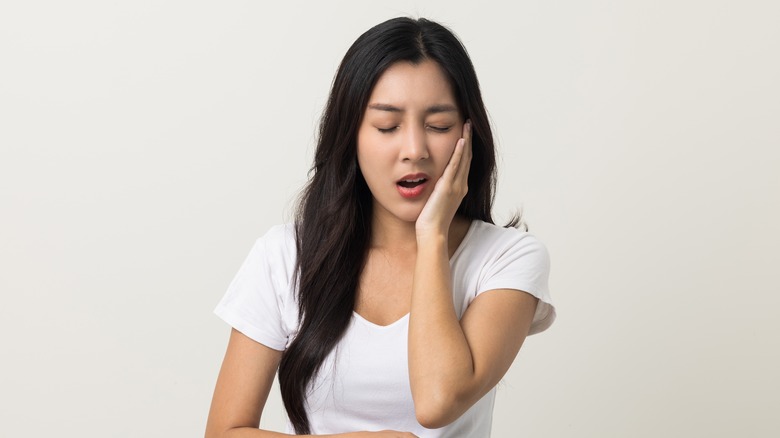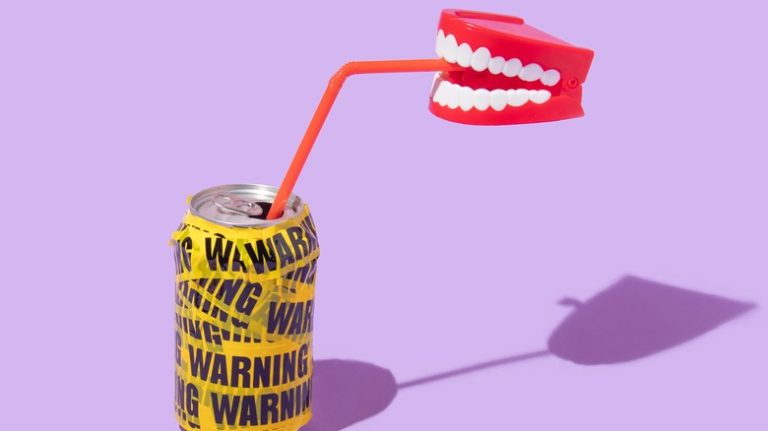Like most other bodily pains, toothaches can be unbearable. Any pain you experience in or around a tooth (mild or severe) can be described as a toothache (via Cleveland Clinic). According to the Centers for Disease Control and Prevention (CDC), 63% of adults over 18 had a doctor’s visit in 2024. Dental issues are undoubtedly a public health problem, and toothache is one of the most common problems. Almost everyone can experience a toothache. Although pain is a typical toothache symptom, the disorder can also come with headache, fever, and swollen glands making daily life uncomfortable, per WebMD. Other symptoms include bad breath, oral bleeding, and the inability to taste food properly, says the source.
According to the National Health Service (NHS), the pain accompanying a toothache can be felt in various ways. For some people, it can be constant. For others, it can be intermittent (being felt from time to time). Other people only experience pain when eating or drinking, especially when the food is extra hot or cold, says the NHS. Interestingly, other people may have unbearable throbbing pain at night, making sleeping uncomfortable. If you experience tooth pain at night but are unsure of the cause, it’s first important to visit your dentist for a proper diagnosis. As a guide, this article offers some insight into the general causes of tooth pain and why your toothache hurts more at night.
General causes of tooth pain
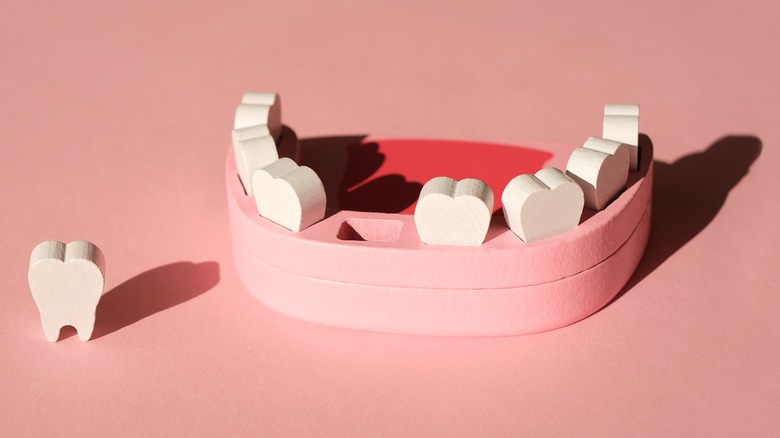
According to the American Association of Endodontists, the main causes of tooth pain are tooth decay, infection, or a cracked tooth. Tooth decay (also known as dental cavities) is one of the most common dental diseases and can cause excruciating pain. The issue arises when acid erodes tooth enamel, forming holes in the teeth, per the Cleveland Clinic. Since cavities can lead to toothaches, extractions, and infections, the earlier the issue is diagnosed, the better.
An abscessed tooth is another cause of tooth pain. According to the NHS, this is due to a bacterial infection causing pus to form inside the tooth. However, the pain doesn’t always come from the tooth itself. Infected gums can also cause tooth pain, says the NHS. Tooth pain might also be linked to bad dental care, like excessively chewing gum and clenching or grinding your teeth, per the Cleveland Clinic.
For some people, tooth pain might be an offshoot of certain health conditions. According to WebMD, a toothache can be a symptom of a migraine, cluster headache, joint problems, or sinus infections. Furthermore, tooth pain may also stem from a heart attack or nerve disease, even though such cases are rare.
Why your tooth might hurt more at night
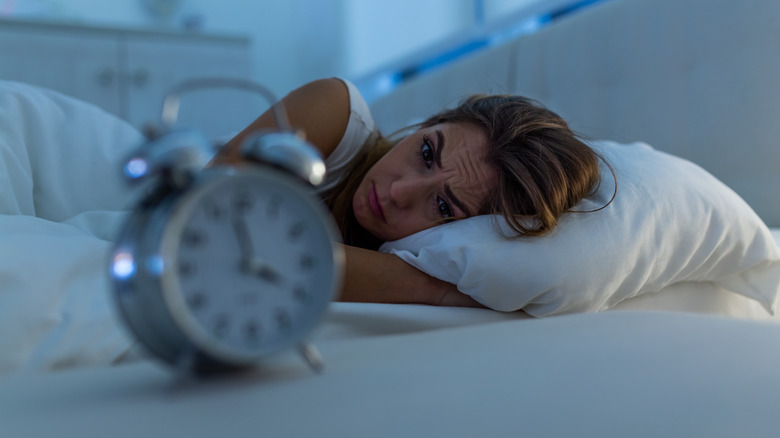
Generally speaking, the causes mentioned above can trigger tooth pain. However, when the pain comes at night, it could be linked to more specific causes, such as tooth grinding (also known as bruxism). According to WebMD, most people grind their teeth occasionally, most especially during sleep, and is usually caused by a crooked or missing tooth. When the grinding happens constantly, it can trigger other dental issues, says WebMD.
Laying down can also trigger severe tooth pain if you already have tooth pain during the day. According to MedicalNewsToday, lying down can worsen the pain at night since extra blood flows through the head. Also, sleep time usually comes with fewer distractions demanding you to focus more on the pain, says Medical News Today. Interestingly, a 2024 study published in the journal Rheumatology, reiterates this claim revealing an increased number of Google searches related to pain management between the hours of 11 p.m.-4 a.m.
When to see a dentist

Zamrznuti tonovi/Shutterstock
If tooth pain persists, it’s important to visit a dentist. According to the NHS, persistent tooth pain may be a sign of a pulp infection which can cause other complications. Bruxism may cause severe facial or jaw pain. Some people may also develop temporomandibular joint disorders, which come with a clicking sound when you open or close your mouth, per the Mayo Clinic. Therefore, it’s crucial to seek early medical diagnosis, especially if the pain becomes unbearable.
Dentists usually diagnose bruxism by examining your temporomandibular joints, teeth, and jaw muscles (via Cleveland Clinic). They might also look into your medical history to understand other underlying issues. If the cause of your tooth pain at night is still unclear, doctors may order further tests, including polysomnography, to help them provide a more definitive diagnosis.
Some tooth pain often improves without treatment. However, more severe dental and mouth problems may not improve independently (via Cleveland Clinic). Infected gums and tooth fractures, for example, may require medical assistance, says the clinic.
Tips to reduce toothache at home

Stockbusters/Shutterstock
While it’s crucial to consult your dentist, you may rely on various home remedies to temporarily relieve tooth pain.
According to the Cleveland Clinic, half a cup of warm brine can help disinfect and loosen debris between your teeth and reduce inflammation. You can use the solution as a rinse, but it’s crucial not to swallow it. If the solution doesn’t work, a 20-minute cold compress on the affected area (repeated once every few hours) might help, says the clinic.
Since nighttime tooth pain can be caused by blood rushing through your head when your lie down, MedicalNewsToday advises elevating your head with an extra pillow to help prevent additional pain and inflammation.
You can also rely on some over-the-counter pain medications like acetaminophen or medicated ointments and numbing gels with pain-relieving ingredients like benzocaine (via Medical News Today).
Certain foods can also aggravate your teeth’ pain. Healthline advises against consuming acidic, cold, or hard foods that require rigorous chewing.
It’s always best to consult your doctor if the tooth pain becomes severe.
Natural remedies for tooth pain
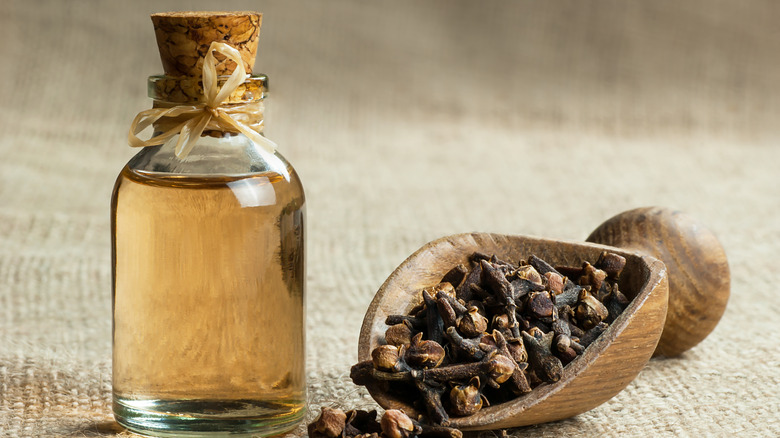
Halil ibrahim mescioglu/Shutterstock
According to Healthline, clove oil contains eugenol, a natural anesthetic that can help reduce toothache. Even though clove oil is unpleasant to taste, its eugenol content is more effective than other anesthetics regarding pain relief and infections, according to a 2024 randomized control trial published in the British Journal of Oral and Maxillofacial Surgery.
You can also try garlic in its raw form. Applying a paste of crushed garlic to the affected area might kill bacteria and help reduce tooth pain, says the Cleveland Clinic.
The clinic also recommends vanilla extract or peppermint tea which can be applied by holding a warm tea bag to the affected tooth or gum. Vanilla can be helpful due to its alcohol content, which numbs pain and serves as temporary relief.
WebMD reiterates the health benefits of vanilla. According to the source, antioxidants contained in vanilla might help heal inflammation faster. However, there’s not enough evidence to conclude if this plant can positively impact dental health.
Generally speaking, traditional healers and herbalists believe in the therapeutic effects of herbal remedies. While many of these plants may help reduce tooth pain, it’s not yet clear how they work. It’s always best to consult your doctor if your symptoms persist or worsen.

